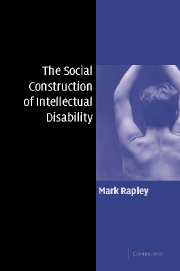Book contents
- Frontmatter
- Contents
- Acknowledgements
- A note on the cover illustration
- A note on transcription notation
- Introduction
- 1 A discursive psychological approach
- 2 Intellectual disability as diagnostic and social category
- 3 The interactional production of ‘dispositional’ characteristics: or why saying ‘yes’ to one's interrogators may be smart strategy
- 4 Matters of identity
- 5 Talk to dogs, infants and …
- 6 A deviant case (written with Alec McHoul)
- 7 Some tentative conclusions
- Appendices
- References
- Index
Introduction
Published online by Cambridge University Press: 20 October 2009
- Frontmatter
- Contents
- Acknowledgements
- A note on the cover illustration
- A note on transcription notation
- Introduction
- 1 A discursive psychological approach
- 2 Intellectual disability as diagnostic and social category
- 3 The interactional production of ‘dispositional’ characteristics: or why saying ‘yes’ to one's interrogators may be smart strategy
- 4 Matters of identity
- 5 Talk to dogs, infants and …
- 6 A deviant case (written with Alec McHoul)
- 7 Some tentative conclusions
- Appendices
- References
- Index
Summary
The aim of a critical history of psychology would be to make visible the relations, profoundly ambiguous in their implications, between the ethics of subjectivity, the truths of psychology and the exercise of power.
(Rose, 1999a: np)An ancient Chinese proverb says, ‘Wisdom begins by calling things by their right name.’ During this period of flux and transition, there may be an opportunity to get the name right for people with mental retardation.
(Schroeder, Gerry, Gertz and Velasquez, 2002: 5)It is, by now, something of a commonplace to refer to things-in-the world – be they ideas, objects or categories of persons – as ‘socially constructed’. Such a commonplace, indeed, that the very idea of ‘the social construction of x’ (whatever x may be), along with the entire project of what is usually described as ‘social constructionist’ (or often it appears, interchangeably, if inaccurately cf. Jacobson, 2001) ‘postmodern’ scholarship, has been famously parodied (Sokal, 1996) and held up to ridicule as a mere ‘intellectual imposture’ (see Sokal and Bricmont, 1999). This book seeks to retrieve something of the utility of the notion of social construction, by way of a detailed examination of professionalised (and essentialised) understandings of persons described as ‘intellectually disabled’, and the analysis of social interactions between members of the helping professions and ‘intellectually disabled’ persons, wherein professional estimation and management of their (in)capacities and (in)capabilities occurs.
- Type
- Chapter
- Information
- Publisher: Cambridge University PressPrint publication year: 2004



